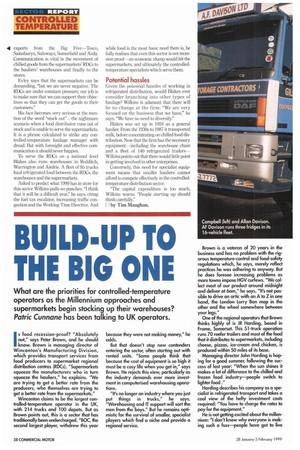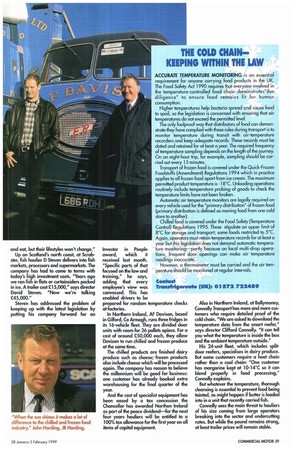BUILD-UP TO THE BIG ONE
Page 40

Page 41

If you've noticed an error in this article please click here to report it so we can fix it.
What are the priorities for controlled-temperature operators as the Millennium approaches and supermarkets begin stocking up their warehouses? Patric Cunnane has been talking to UK operators.
Is food recession-proof? "Absolutely not," says Peter Brown, and he should know. Brown is managing director of Wincanton's Manufacturing Division, which provides transport services from food producers to supermarket regional distribution centres (RDCs). "Supermarkets squeeze the manufacturers who in turn squeeze the hauliers," he explains. "We are trying to get a better rate from the producers, who themselves are trying to get a better rate from the supermarkets."
Wincanton claims to be the largest controlled-temperature operator in the UK, with 214 trucks and 100 depots. But as Brown points out, this is a sector that has traditionally been undercharged_ "BOC, the second largest player, withdrew this year because they were not making money," he adds.
But that doesn't stop new contenders entering the sector, often starting out with rented units. "Some people think that because the cost of equipment is so high it must be a cosy life when you get in," says Brown. He rejects this view, particularly as the industry demands ever more investment in computerised warehousing operations.
"It's no longer an industry where you just put things in trucks," he says. "Warehousing and IT support will sort the men from the boys." But he remains optimistic for the survival of smaller, specialist players which find a niche and provide a regional service.
Brown is a veteran of 20 years in the business and has no problem with the rigorous temperature-control and food-safety regulations which, he says, merely reflect practices he was adhering to anyway_ But he does foresee increasing problems as more towns impose HGV curfews. "We collect most of our product around midnight and deliver at Oam," he says. "It's not possible to drive an artic with an A to 1 in one hand, the London Lorry Ban map in the other and the wheel somewhere between your legs." One of the regional operators that Brown thinks highly of is JR Harding, based in Frame, Somerset. This 51-truck operation runs 70 reefer trailers and most of the food that it distributes to supermarkets, including cheese, pizzas, ice-cream and chicken, is produced within 50 miles of its base.
Managing director John Harding is hoping for a good summer, following the success of last year: "When the sun shines it makes a lot of difference to the chilled and
frozen food industry people switch to lighter food ." Harding describes his company as a specialist in refrigerated transport and takes a cool view of the hefty investment costs required: "You have to charge the rates to pay for the equipment." He is not getting excited about the millennium: "I don't know why everyone is making such a fuss—people have got to live and eat, but their lifestyles won't change."
Up on Scotland's north coast, at Scrabster, fish haulier D Steven delivers into fish markets, processors and supermarkets. The company has had to come to terms with today's high investment costs. "Years ago we ran fish in flats or curtainsiders packed in ice. A trailer cost £15,000," says director David Steven. "Now we're talking £45,000."
Steven has addressed the problem of keeping up with the latest legislation by putting his company forward for an Investor in People award, which it received last month. "Specific parts of that focused on the law and training," he says, adding that every employee's view was canvassed. This has enabled drivers to be prepared for random temperature checks at factories.
In Northern Ireland, AF Davison, based in Gilford, Co Armagh, runs three fridges in its 16-vehicle fleet. They are divided door units with room for 26 pallets apiece. For a cost of around £50,000 each, they allow Davison to run chilled and frozen produce at the same time.
The chilled products are finished dairy produce such as cheese; frozen products also include cheese which will be processed again. The company has reason to believe the millennium will be good for business: one customer has already booked extra warehousing for the final quarter of the year.
And the cost of specialist equipment has been eased by a tax concession the Chancellor has awarded Northen Ireland as part of the peace dividend—for the next four years hauliers will be entitled to a 100% tax allowance for the first year on all items of capital equipment. Contact
Also in Northern Ireland, at Ballymoney, Connolly Transport has more and more customers who require detailed proof of the cold chain. "We are asked to download the temperature data from the smart reefer," says director Clifford Connolly. "It can tell you what the temperature is inside the box and the ambient temperature outside."
His 24-unit fleet, which includes splitdoor reefers, specialises in dairy produce. But some customers require a heat chain rather than a cool chain: "One customer has margarine kept at 10-14°C so it can blend properly in food processing," Connolly explains. But whatever the temperature, thorough cleansing is essential to prevent food being tainted, as might happen if butter is loaded into in a unit that recently carried fish.
Connolly sees the main threat to hauliers of his size coming from large operators breaking into the sector and undercutting rates. But while the pound remains strong, at least trailer prices will remain stable.








































































































